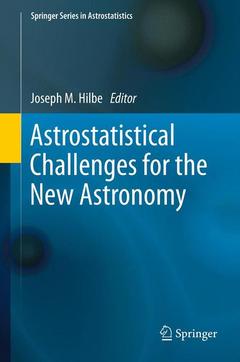Astrostatistical Challenges for the New Astronomy, 2013 Springer Series in Astrostatistics Series, Vol. 1

Joseph Hilbe, Jet Propulsion Laboratory and Arizona State University, Astrostatistics: A brief history and view to the future.- Thomas Loredo, Cornell Univ, Bayesian astrostatistics: A backward look to the future.- Stefano Andreon, INAF-Osservatorio Astronomico di Brera, Italy, Understanding better (some) astronomical data using Bayesian methods.- Martin Kunz, Institute for Theoretical Physics, Univ of Geneva, BEAMS: separating the wheat from the chaff in supernova analysis.- Benjamin Wandelt, Institut d'Astrophysique de Paris, Université Pierre et Marie Curie, France, Cosmostatistics.- Roberto Trotta, Astrophysics Group, Dept of Physics, Imperial College London (with Farhan Feroz (Cambridge), Mike Hobson (Cambridge), and Roberto Ruiz de Austri (Univ of Valencia, Spain), Recent advances in Bayesian inference in cosmology and astroparticle physics thanks to the Multinest Algorithm.- Phillip Gregory, Department of Astronomy, Univ of British Columbia, Canada, Extrasolar planets via Bayesian model fitting.- Marc Henrion, Dept of Mathematics, Imperial College, London, UK (with Daniel Mortlock (Imperial), Axel Gandy (Imperial), and David J. Hand (Imperial)), Subspace methods for anomaly detection in high dimensional astronomical databases.- Asis Kumar Chattopadhyay, Dept of Statistics, Univ of Calcutta, India (with Tanuka Chattyopadhyay, Tuli De, and Saptarshi Mondal), Independent Component Analysis for dimension reduction classification: Hough transform and CASH Algorithm.- Marisa March, Astrophysics Group, Dept of Physics, Imperial College London (with Roberto Trotta), Improved cosmological constraints from a Bayesian hierarchical model of supernova type Ia data
Joseph M. Hilbe is President of the International Astrostatistics Association, and chair of the ISI astrostatistics committee. ISI is the International Statistical Institute, the world association of statisticians. Prof. Hilbe is also editor-in-chief of the Springer Series in Astrostatistics and chaired the World Statistics Congress invited and special topics sessions from which eight of the book’s monographs originated. An elected Fellow of the American Statistical Association and Elected Member of the ISI, Professor Hilbe is author of several leading texts in statistical modeling, including “bestsellers’’ NegativeBinomial Regression, 2nd ed. (2011, Cambridge Univ Press) and Logistic RegressionModels (2009, Chapman & Hall/CRC) among others.
Provides a concise introduction to statistical astronomy in the context of many recent discoveries
Details various traditional and non-traditional methodologies for analyzing and interpreting large scale data sets in this field
Special topics such as super-nova and extra-solar planets analysis covered in detail
Date de parution : 12-2014
Ouvrage de 238 p.
15.5x23.5 cm
Date de parution : 11-2012
Ouvrage de 238 p.
15.5x23.5 cm



